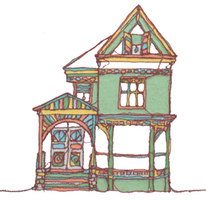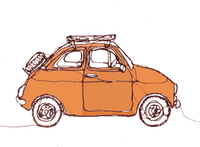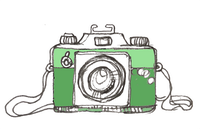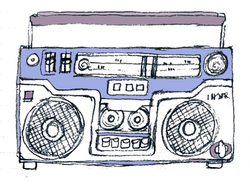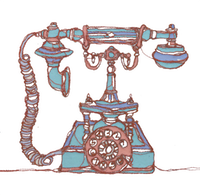We use cookies to provide the best site experience.
Ninfa Burnham

If you are interested in a personalised piece of art or have any other questions, please send me a message using this form...
The information you provide on this form will only be used to contact you in relation to your message unless you have also ticked the box to receive e-mail updates from me.
Join my mailing list for updates on new arrivals, inspirations and special offers
Theatrical Claret
Casa Beethoven
Barcelona
Barcelona
Just around the corner from the Palau de la Virreina, set back from The Ramblas at number 97 is this music shop
Casa Beethoven.
Recently, I met with Jaume Doncos, part of the family ensemble that have dedicated themselves to this Barcelona icon for most of its existence. First opened in 1880 by Rafael Guàrda, it was in fact originally called Casa Guàrdia before its name was changed to Casa Beethoven.
Recently, I met with Jaume Doncos, part of the family ensemble that have dedicated themselves to this Barcelona icon for most of its existence. First opened in 1880 by Rafael Guàrda, it was in fact originally called Casa Guàrdia before its name was changed to Casa Beethoven.
By around 1915, Jaume's Great Uncle Lluis Llordà had taken the helm and Jaume's father, a musician, would later work at the shop between his concerts. It is Llordà, a composer himself, who changed the name of the shop to Casa Beethoven after one of the world's most celebrated composers and a symbol of liberty.
Jaume has worked at the music shop since he was 17 years old (so, for almost 40 years). He has learned a lot of what he knows from his father (also called Jaume) and has worked the rest out himself. His sisters Angela and Noemí are also part of the team. The shop specialises in selling sheet music of every description including classical, rock, pop, and film and scores. (They have an archive of over 30,000).
Jaume has worked at the music shop since he was 17 years old (so, for almost 40 years). He has learned a lot of what he knows from his father (also called Jaume) and has worked the rest out himself. His sisters Angela and Noemí are also part of the team. The shop specialises in selling sheet music of every description including classical, rock, pop, and film and scores. (They have an archive of over 30,000).
In the late 1800's, you would have seen a lot of these music shops in Barcelona. At that time, there were no discs, no recorded music, so if you wanted to listen to music at home you would listen to it live - you would buy the sheets and play it yourself. When gramophones and records came along and became more affordable in the early 1900's, people started buying more of the 78's and less of the music sheets. Gradually, many of these shops closed.
2014 marked the end of rent controls in Barcelona, with changes in the Spanish urban lease law (LAU). Many long term rents were raised dramatically, and new contracts came into force along with City Hall requirements to update and restore premises. All of this, coupled with competition from the big internationals and online trade has made it impossible for many businesses to afford to stay open. The Musical Emporium had been trading for 114 years before Lluis Castelló had to close its doors permanently in 2014.
Today, shops like Casa Beethoven are a rarity. We talked about how it has managed to survive the changes and trends of the street. Jaume believes that having the continuity of family in the business has brought with it a common goal and dedication. The value of passing down collective knowledge through the generations cannot be underestimated. Being a musical family has also helped them enormously - the interest they have for their product is authentic and they have an affinity with many of their customers. The shop comes from a long tradition of resilience and tenacity too - during the Spanish Civil War for instance, when imports of international sheet music were very restricted, Jaume's great uncle's contacts served him well. I get the impression that this international outlook, the legacy of Great Uncle Llordà, has been important in the longevity of the shop.
Today, shops like Casa Beethoven are a rarity. We talked about how it has managed to survive the changes and trends of the street. Jaume believes that having the continuity of family in the business has brought with it a common goal and dedication. The value of passing down collective knowledge through the generations cannot be underestimated. Being a musical family has also helped them enormously - the interest they have for their product is authentic and they have an affinity with many of their customers. The shop comes from a long tradition of resilience and tenacity too - during the Spanish Civil War for instance, when imports of international sheet music were very restricted, Jaume's great uncle's contacts served him well. I get the impression that this international outlook, the legacy of Great Uncle Llordà, has been important in the longevity of the shop.
There's no denying that technology has had an effect on the business - from the gramaphone in the late 1800s to digital downloading and streaming today. Over the years, the Doncos family have found that they've had to work much longer hours to stay in the game. They have also diversified, expanding their repertoire of products to CDs, and DVDs, books, musical instruments and memorabilia. I must say, I'm particularly fond of their collection of little music boxes that sit at the entrance to the shop. All that said, Casa Beethoven's strength is their archive of music, their niche product.
During the shop's existence, professors and students from the Liceu Conservatory and musicians from all over the world have crossed its threshold. (Jaume name-dropped a few including Montserrat Caballé and Tito Puente). Near to the back of the shop sits the piano that has been a permanent fixture from the beginning. In my ink collage, peer through the open door and you'll spot Jaume's father playing it. For over a century on Saturday afternoons, musicians have been meeting up around this piano to play together - a tradition that stems from a time when shops were meeting places for the community as much as a place to buy things.
Casa Beethoven is on La Rambla 97 in Barcelona
Visit the platform rutadelsemblematics.cat
A project dedicated to preserving and promoting iconic establishments of Barcelona.
A project dedicated to preserving and promoting iconic establishments of Barcelona.


Only a few years ago for instance, we had to say adios to the Musical Emporium, which was just up from Casa Beethoven on the same side of Las Ramblas at number 109. It is now a Bureau De Change and to be honest, it does sadden me to look at it when I walk down that street.





Another distinctive feature inside is the impressively long wooden table that runs a fair way down the length of shop.
It's supported by three beautiful wrought iron legs that grab your attention, even from the pavement outside. Rising up above the table are shelves full of claret red music files, adding a little theatrical touch to the space.
Speaking of the pavement outside…the facade of Casa Beethoven is elegant yet quite austere compared to some Modernista shops in Barcelona. This only makes the curvy mouldings of the woodwork and the sinuous details of the handles stand out more. The letters for the sign that read MÚSICA are detailed to give a hint of theatrical glitz too.
It's supported by three beautiful wrought iron legs that grab your attention, even from the pavement outside. Rising up above the table are shelves full of claret red music files, adding a little theatrical touch to the space.
Speaking of the pavement outside…the facade of Casa Beethoven is elegant yet quite austere compared to some Modernista shops in Barcelona. This only makes the curvy mouldings of the woodwork and the sinuous details of the handles stand out more. The letters for the sign that read MÚSICA are detailed to give a hint of theatrical glitz too.
Inked collage of Casa Beethoven
Angela and Jaume outside the shop
''This avocado green trimphone brings back strong memories of my teenage sister in the late 1970s - with
Farah Fawcett hair flicks, sprawled across our swirly patterned brown stairs chatting to her friends for a LONG time - and mum going crazy because of the spiral cable across the hall...
and the telephone bill.''
and the telephone bill.''
Art and the everyday...
Discover Storyful Art
Let's discuss a personalised piece of art
Are you interested
in something specific?
in something specific?



Bookshelves are filled with all sorts of paraphernalia from our lives, including books of course! Have you grown to accept the steady migration of bits and pieces that come to populate the shelves? - memories from your travels, keepsakes nestled between a couple of 'volumes' and books half read then put down open for easy access later on. Bookshelves grow to reflect our lives.
''This avocado green trimphone brings back strong memories of my teenage sister in the late 1970s - with
Farah Fawcett hair flicks, sprawled across our swirly patterned brown stairs chatting to her friends for a LONG time - and mum going crazy because of the spiral cable across the hall...
and the telephone bill.''
and the telephone bill.''
The Everyday...
We can discuss a personalised piece of art
Are you interested
in something specific?
in something specific?


Bookshelves are filled with all sorts of paraphernalia from our lives, including books of course! Have you grown to accept the steady migration of bits and pieces that come to populate the shelves? - memories from your travels, keepsakes nestled between a couple of 'volumes' and books half read then put down open for easy access later on. Bookshelves grow to reflect our lives.
Find out more about commissioning a personalised piece of art
You can also find me here...

